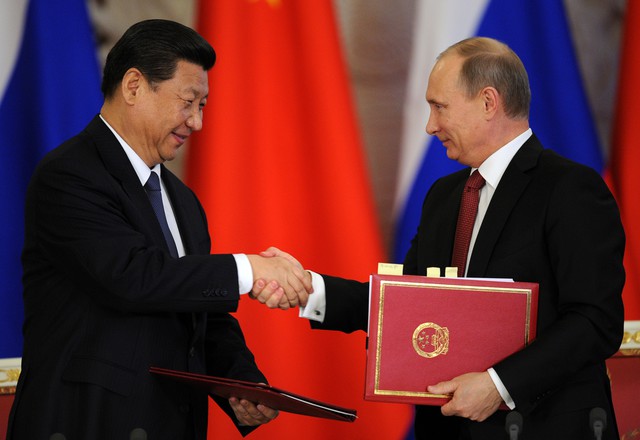
Russian President Vladimir Putin and Chinese President Xi Jinping pledged to deepen their partnership during a meeting in Beijing on Thursday, May 16, highlighting their countries' united front against the West. This meeting comes as Putin intensifies his offensive in Ukraine and follows his recent military leadership shake-up.
Putin's visit to China, his first international trip since starting his fifth term, underscores the strong ties between the two nations despite the ongoing war in Ukraine. The leaders signed a joint statement to enhance their comprehensive strategic partnership, although it stopped short of forming a formal alliance. This strategic ambiguity serves as a deterrent to the U.S. and its allies, according to Natasha Kuhrt of King's College London. (Related: FORGED IN FIRE: Russia-China ties reach "unprecedented" level amid tensions with the West.)
Russia and China, celebrating 75 years of diplomatic relations, have faced significant tests due to the Ukraine conflict and Putin’s increasing isolation from the West. China, portraying itself as neutral, has nonetheless supported Russia diplomatically and economically, becoming a key market for Russian oil and gas amid Western sanctions.
China's 12-point peace plan, perceived as favoring Russia's territorial claims, has been dismissed by the West. Despite this, Xi expressed hopes for peace in Europe and pledged to continue playing a constructive role.
The U.S. has ramped up military aid to Ukraine and imposed sanctions on Chinese companies aiding Russia. During a recent visit to Beijing, U.S. Secretary of State Antony Blinken said Russia's war effort would falter without China's support and threatened further sanctions.
Xi, balancing relations with the West and Russia, faces pressures from European leaders to leverage his influence over Putin to end the conflict. This diplomatic tightrope is evident as Chinese exports to Russia saw a decline in March for the first time since 2022.
Putin's visit to China included full military honors and talks with Xi, followed by a planned visit to Harbin for a China-Russia trade fair. Putin highlighted the "unprecedented level of strategic partnership" with China as the reason for his visit.
Accompanying Putin was Andrey Belousov, the new Russian defense minister, following a surprise military leadership change. Russia's renewed offensive in northern Ukraine has raised concerns among Kyiv and its allies about potential decisive gains by Putin's forces.
His visit coincides with ongoing, casualty-heavy advances by Russian forces, facilitated by a six-month delay in new U.S. aid for Ukraine.
Russia, China to enhance "no limits" partnership
The two leaders and their teams have talked about enhancing their "no limits" partnership. They issued a joint statement promising a deepened strategic partnership and heralding a "new era."
But despite their talk of growing cooperation and increased trade, Chinese exports to Russia have recently declined. This trend reflects U.S. warnings against providing military aid to Moscow and violating sanctions on Russia.
While China's oil and gas purchases have helped Russia withstand Western sanctions, Beijing appears cautious about overly antagonizing the West, evident by the absence of Gazprom's head from the Russian delegation.
Notably, Putin praised China's peace proposals for Ukraine, likely an attempt to dissuade China from attending the mid-June Swiss conference on Ukrainian President Volodymyr Zelensky's peace plan. Moscow was displeased when China participated in the last conference in Saudi Arabia.
In essence, this summit reflects more of the same dynamics. The two nations are united by their opposition to the United States. In the face of a challenging war, Putin seeks greater economic and military assistance from China. While China would prefer a Russian victory, it remains cautious about provoking the U.S. and the West with increased support.
Watch Putin talk about Russia's long history of cooperation with China.
This video is from the Cynthia's Pursuit of Truth channel on Brighteon.com.
More related stories:
Intelligence report: China likely providing military aid to Russia.
Russia, China discussing plans to "double counteract" U.S.-led alliance of Western nations.
U.S. Space Force: China and Russia are CONCEALING THREATS posed by their satellites.
Sources include:
Please contact us for more information.













